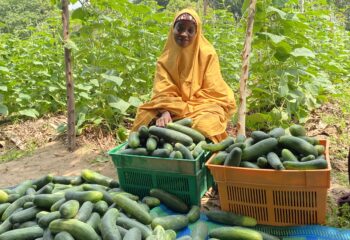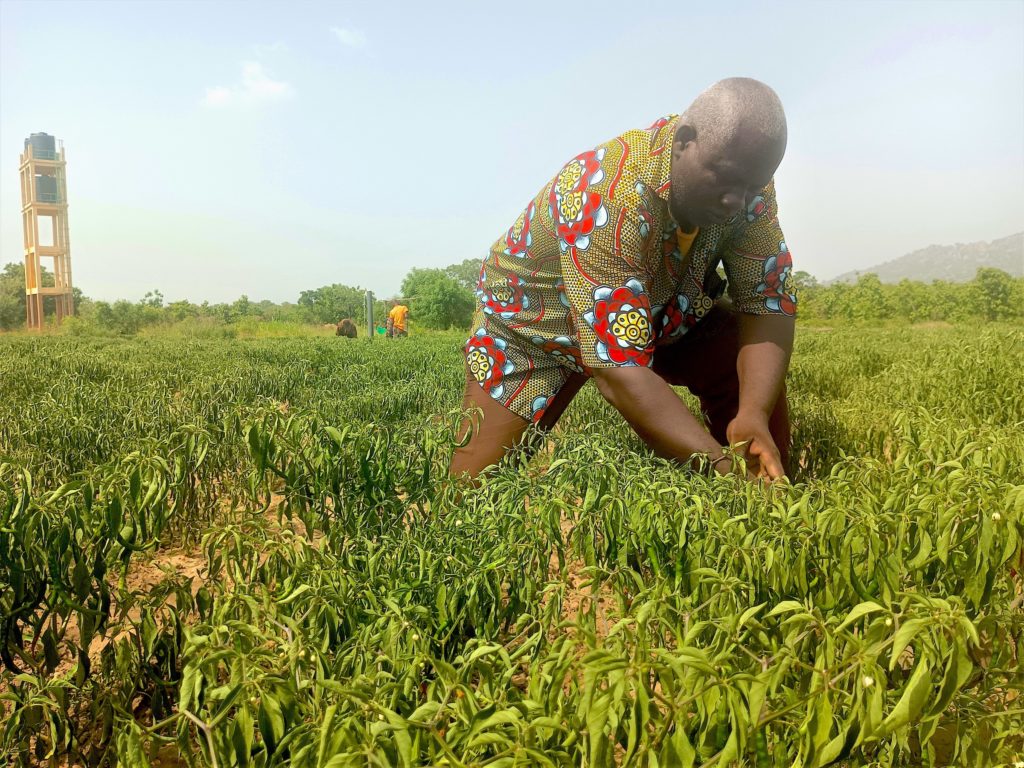
The Communal Approach to the Agricultural Market (ACMA) program, during its second phase, invested more in strengthening the adoption of good agricultural practices, with respect to the land. Moïse Houndote, president of the Union Communale des Coopératives Maraîchères de Dassa-Zoumé (Itagui), in the Kèrè district of Benin, shares that he has benefited from the program through improvement in his pepper production.
In 2021, my yield in chili pepper was estimated to be about 6 metric tons per hectare (mt/ha), compared to 1 mt/ha when I used the traditional practices.
“I am married and the father of seven children. I started market gardening at a very young age. Four years ago, I was elected to lead the Union Communale des Coopératives Maraîchères de Dassa-Zoumé. In the commune, most of the farmers cultivate chili pepper using traditional cultivation practices with many challenges related to pest management, organization of farmer groups, and lack of access to agricultural inputs.
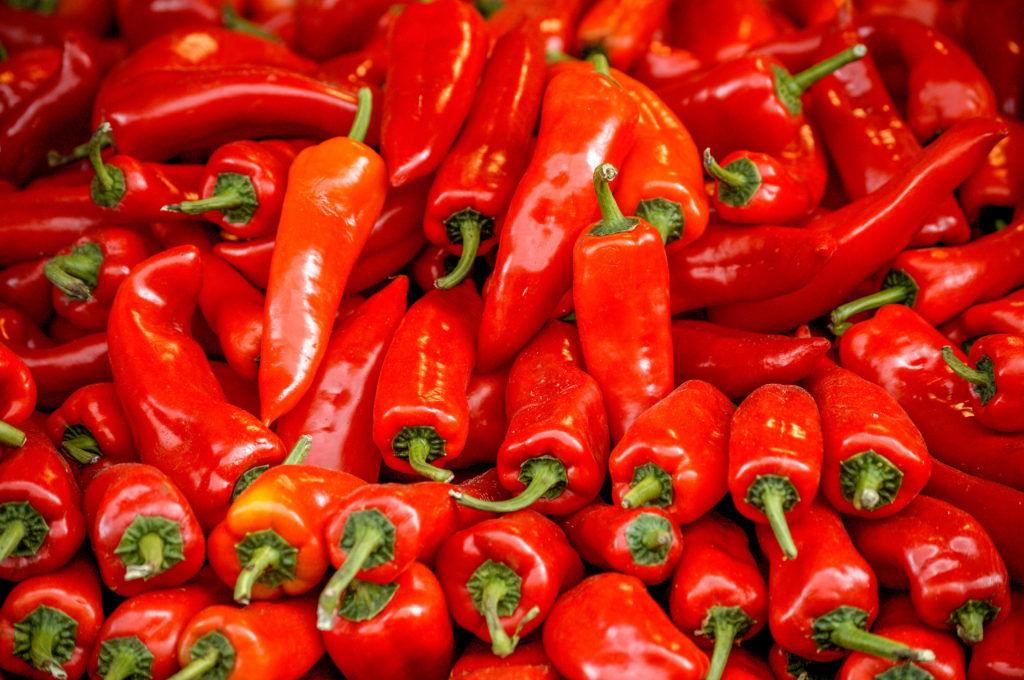
The production system is mostly rainfed, and farmers did not have a system for water management. In 2018, the ACMA program identified our commune as a target for its interventions. We presented our different problems, and ACMA2 took into account the needs of producers like me. The infrastructure for a market garden with an irrigation system was then built for us, and then the agricultural extension specialists, including those from RAD-ONG, were made available to us to strengthen our capacity on innovative pepper-growing techniques and the network for mobilizing inputs and marketing our products. The RAD-ONG staff were available to us on a daily basis during the last two production seasons. Their support was focused on the adoption and scaling-up of the good agricultural practices demonstrated and promoted by ACMA2 and facilitating access to inputs and markets, all with a view toward making us increasingly self-sufficient.
We have had exceptional results on the Itagui perimeter with the intensification approach promoted by ACMA2, which combines several types of inputs in specific proportions. The seeds we used were certified. I remember it like it was yesterday. We had already seen through the demonstration fields that the yields were different. Over the years, the yields have become even better because our knowledge of good agricultural practices has improved. In 2021, my yield in chili pepper was estimated to be about 6 metric tons per hectare (mt/ha), compared to 1 mt/ha when I used the traditional practices. The most successful producer that year had an estimated yield of over 8 mt/ha. We also analyze the markets with the help of the marketing facilitator to prevent losses. We have even sold fresh chili instead of dried chili in certain circumstances. In 2021, my friend Paul harvested about 253 kilograms of fresh pepper at a value of 85,650 CFA francs (about U.S. $143) on a plot of 400 square meters and had a profit margin of more than 40,000 CFA francs (about U.S. $67).
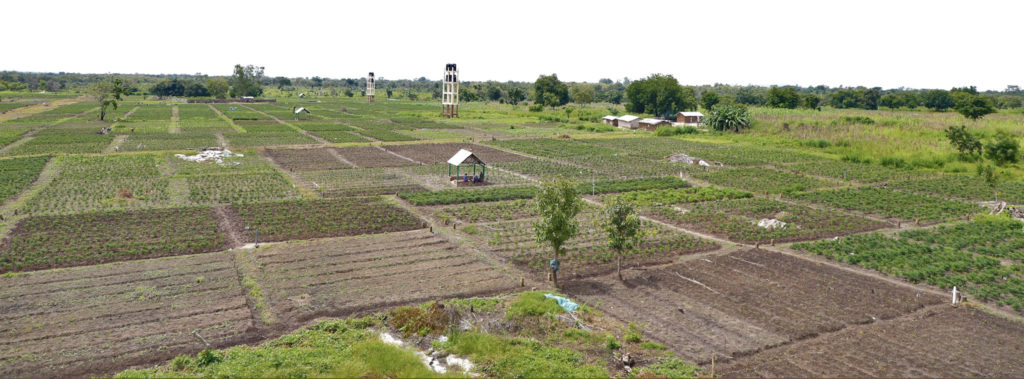
In the beginning, ACMA2 and the Africa Green Corporation helped us to obtain a loan for our production activities. The 19 producers working on the site in 2020 received a loan of 7,280,000 CFA francs (about U.S. $12,131). This was used to finance the costs of production, particularly the purchase of inputs; however, yields were not satisfactory. In fact, we were not able to mobilize the inputs in time, and the production schedule was not rigorously followed. The post-harvest conservation techniques were not well understood in the beginning, and many losses were recorded. The irrigation system also broke down, and the water shortage recurred. Even with the much-needed credit, we could not achieve our goals. Money alone was not enough to help us succeed in our production activities. At that time, we were unable to repay the loan. It has not been easy, I must admit.
In 2021, RAD-ONG supported us in establishing a better organizational structure. This was complemented with on-site technical monitoring, training on good agricultural practices and digital finance, and facilitation of input supply and access to markets. The irrigation system was also repaired, with water reservoirs that were recently constructed. And the results were not long in coming! Currently, thanks to our production, we have repaid all our loans, with enough money to pay for our household needs, and the current season will be even better.
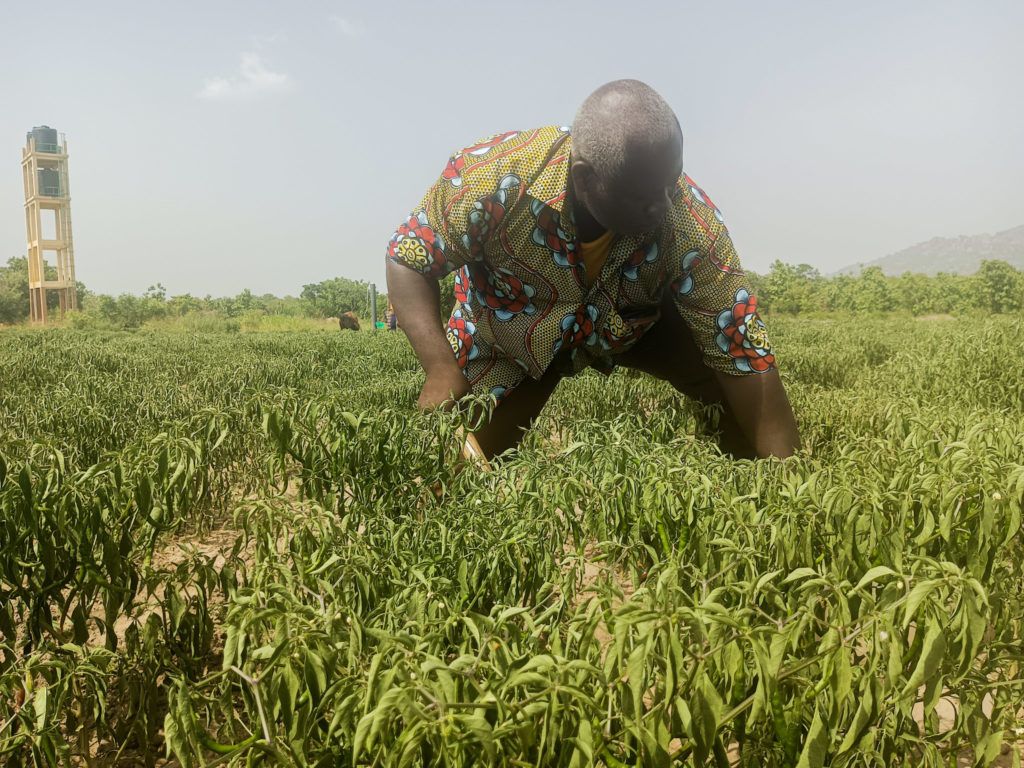
The OKP-TMT+.20/00065 project was introduced to us in November 2020. Financed by the Embassy of the Kingdom of the Netherlands in Benin, the project seeks to develop a value chain for pepper and tomato processing in Dassa. To develop synergies with ACMA2, the project identified the producers of our site as potential suppliers of raw materials for the processing unit under construction by Africa Green. Through this project, we benefited from several trainings on the organization of cooperatives, negotiation and contractualization, and the development of business relationships. But it doesn’t end there, because this processing unit will make up a large market for us. The complementarity between the OKP-TMT+.20/00065 project and the ACMA program is a tremendous opportunity for us.”
The ACMA program, funded by the Embassy of the Kingdom of the Netherlands in Benin, is now in its third phase (2022-2027). The program is being implemented in the Collines, Donga, and Borgou departments of Benin, working in the priority sectors of maize, cassava, soy, groundnut, small ruminants, poultry, and market gardening.




